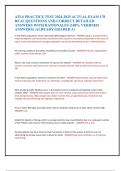ATLS PRACTICE TEST 2024-2025 ACTUAL EXAM 170
REAL QUESTIONS AND CORRECT DETAILED
ANSWERS WITH RATIONALES (100% VERIFIED
ANSWERS) |ALREADY GRADED A+
In the elderly population, what is decreased physiological reserve? - ANSWER-aging is characterized by
impaired adaptive and homeostatic mechanisms that caused an increased susceptibility to the stress of
injury. Insults tolerated by the younger population can lead to devastating results in elderly patients.
Pre-existing conditions that affect morbidity and mortality include: - ANSWER-cirrhosis, coagulopathy,
COPD, ischemic heart disease, DM
What is the most common mechanism of injury in the elderly? - ANSWER-Fall. Nonfatal falls are
common in women and fractures are common in women who fall. Falls are the most common cause of
TBI.
In the elderly population, what are risk factors for falls? - ANSWER-advanced age, physical impairment,
history of previous fall, medication use, dementia, unsteady gait, and visual, cognitive impairment
Most of elderly traffic fatalities occur in the daytime and on weekends and typically involve other
vehicles. Why? - ANSWER-Older people drive on more familiar roads and at lower speeds and tend to
drive during the day. Older people have slower reaction time, a larger blind spot, limited cervical
mobility, decreased hearing, and cognitive impairment.
True or False? Mortality associated with small to moderate sized burns in older adults remains high -
ANSWER-True
Spilled hot liquids on the leg, which in younger patients may re-epithelialize due to an adequate number
of hair follicles, will result in a full thickness burn in older patients. - ANSWER-this is true
Airway-patients may have dentures that may loosen or obstruct the airway. If dentures are not
obstructing the airway, leave them in place for what? - ANSWER-bag mask ventilation, as it improves
mask fitting.
,When preforming rapid sequence intubation, the dose of benzos, barbiturates, and other sedatives
should be reduced to what percentage to minimize the risk of cardiovascular depression? - ANSWER-20-
40%
Functional changes in cardiac system include declining function, decreased sensitivity to
catecholamines, atherosclerosis of coronary vessels, increased afterload, fixed heart rate (beta blockers)
- ANSWER-this results in lack of classic response to hypovolemia, risk for cardiac ischemia, elevated BP
at baseline, and increased risk of dysrythmias.
Functional changes in pulmonary system include decreased elastic recoil, reduced residual capacity,
decreased gas exchange and decreased cough reflex - ANSWER-thus they are at increased risk for
respiratory failure, increased risk for pneumonia, and poor tolerance to rib fractures
Functional changes in renal system include loss of renal mass, decreased GFR, and decreased sensitivity
to ADH and aldosterone - ANSWER-resulting in drug dosing for renal insufficiency, decreased ability to
concentrate urine, increased risk for AKI and urine flow may be normal with hypovolemia
Functional changes to MSK include loss of lean body mass, osteoporosis, changes in joints and cartilage,
c spine degenerative changes and loss of skin elastin and subcutaneous fat - ANSWER-resulting in
increased risk for fractures, decreased mobility, difficulty for oral intubation, risk of skin injury, increased
risk for hypothermia, challenges in rehabiliation
Functional changes in Endocrine system include decreased production and response to thyroxin and
decreased dehydroepiandrosterone (DHEA) - ANSWER-resulting in occult hypothyroidism, relative
hypercortisone states and increased risk of infection
True or false: Arthritis can complicate the airway and cervical spine. Patients can have multilevel
degenerative changes affecting disk spaces and posterior elements associated with severe central canal
stenosis, cord compression, and myelomalacia - ANSWER-true
In elderly population, due to their changes in pulmonary system, placing a gauze between gums and
cheek to achieve seal when using bag valve mask ventilation is okay. In addition, because aging causes a
suppressed heart rate response to hypoxia...... - ANSWER-respiratory failure may present insidiously in
older adults.
, Age related changes in the cardiovascular system place the elderly trauma patient at significant risk for
being inaccurately categorized as hemodynamically stable. - ANSWER-Elderly patients have a fixed heart
rate and fixed cardiac output, thus, their response to hypovolemia will involve increasing their systemic
vascular resistance. Furthermore, since older patients have HTN, an acceptable BP may truly reflect a
hypotensive state. A systolic BP of 110 is to be utilized as the threshold for identifying hypotension in
patients 65 and older.
Do no equate blood pressure with shock in older patients - ANSWER-BP in older patients may look
normal due to the medications they are on. Use lactate and base deficit to evaluate for evidence of
shock
what 2 factors place elderly patients at risk for intracranial hemorrhage? - ANSWER-aging causes dura to
become more adherent to the skull increasing risk of injury and older patients are on anticoagulant and
antiplatelet medications.
Loss of subcutaneous fat, nutritional deficiencies, chronic medical conditions place elderly patients as
risk for hypothermia and complications for immobility. - ANSWER-Rapid evaluation and when possible
early liberation from spine boards and cervical collars will minimize complications.
True or False: Fall prevention is the mainstay of reducing the mortality associated with pelvic fractures. -
ANSWER-true
poor hygiene, dehydration, oral injury, contusions affecting the inner arms, inner thighs, palms, soles,
scalp, ear, nasal bridge and temple injury from being struck while wearing glasses, contact burns and
scalds. These are all signs of.......? - ANSWER-Elder maltreatment. The presence of physical findings of
maltreatment should prompt a detailed history. if history conflicts with findings, immediately report
findings to authorities.
True of false: early activation of the trauma team may be required for elderly patients who do not meet
traditional criteria for activation - ANSWER-True. A simple injury such as an open tibia fracture in a frail
elderly patient may become life threatening.
Common mechanisms of injury include falls, MVC, burns, and penetrating injuries - ANSWER-common
injuries in the elderly include rib fractures, TBI, pelvic fractures




